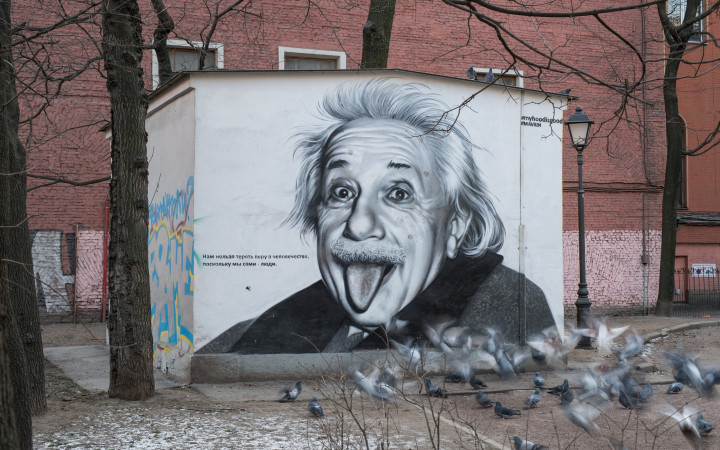Today’s Wonder of the Day was inspired by Sudha. Sudha Wonders, “Who was Albert Einstein?” Thanks for WONDERing with us, Sudha!
Has anyone ever told you that E = mc²? Have you ever heard of the theory of relativity? If so, you may know that these are both important concepts in the world of physics. And you may recognize the name at the center of today’s Wonder of the Day—Dr. Albert Einstein!
Who was Albert Einstein? Many would call him the father of modern physics. After all, he contributed more to the study than just about any other 20th century scientist.
If you knew Einstein as a kid, though, you may not have known he would have such an impact on the world. He was born on March 14, 1879, and grew up in Munich, Germany. Einstein excelled in physics and math classes, but he had a hard time with the rules at school. He withdrew from his classes when he was 16.
Of course, that didn’t mean Einstein stopped learning. Instead, he continued to study, guided by his own curious nature. In fact, you might say it was Einstein’s sense of WONDER that led to his success. He was highly inquisitive and enjoyed seeking out answers to his most burning questions about the world.
Eventually, Einstein moved to Zurich, Switzerland, to study at the Swiss Federal Polytechnic School. Before he could gain entrance, though, he had to complete his high school diploma. Once enrolled in college, he trained to teach physics and math. He graduated in 1900.
After school, Einstein had a hard time finding a job. Finally, in 1902, he accepted a position at the Swiss patent office. The next year, he married his first wife, Mileva Maric. She had also trained in physics—in fact, the two were former classmates. Today, some people even believe that Maric may have contributed to Einstein’s work.
1905 was important for Einstein. Some even call it his “miracle year.” That’s because he published four papers that would have a major impact on the world of physics. It was also the year he submitted a paper to earn his doctorate degree.
What were these four important papers? They explained the photoelectric effect, existence of atoms, special relativity, and energy. The paper on energy also introduced the famous formula E = mc².
From there, Dr. Einstein’s career took off. He became a professor at several colleges, including the University of Prague and the University of Berlin. By World War I, he was living most of the time in Germany. In 1921, he won the Nobel Prize in Physics. Einstein gave the prize money to Mileva Maric, even though the two had divorced. In fact, at that time, he was already married to his second wife, Elsa.
For the next decade, Dr. Einstein continued to teach, research, and write. In 1933, he left Germany to work at Princeton just one month before Adoph Hitler rose to power. As a scientist of Jewish descent, his home country was no longer a safe place for him. He gave up his German citizenship soon after leaving the country.
In the late 1930s, Einstein’s formula E = mc² became central to scientists’ work on the atomic bomb. Dr. Einstein was a pacifist and didn’t support the making of the bomb. However, he feared what could happen if Germany built atomic weapons before the U.S. and its allies did.
As a result, Dr. Einstein wrote to President Franklin D. Roosevelt in 1939 telling him that uranium could be used to build the atomic bomb. As a result, the Uranium Committee was formed and, later, the Manhattan Project began. After the bombing of Hiroshima and Nagasaki, Einstein helped form the Emergency Committee of Atomic Scientists. The group’s purpose was to push world leaders to slow the creation of nuclear weapons.
For the rest of his life, Dr. Einstein was an advocate for peace. He also encouraged equality as a supporter of the Civil Rights Movement and member of the NAACP. Einstein continued to study physics and mathematics. Much of his later work focused on black holes, wormholes, and theories of creation. He even looked into the possibilities of time travel and higher dimensions.
Dr. Einstein died on April 18, 1955, after refusing surgery following an aneurysm. Most of his body was cremated, but his brain was taken for scientific study. This may have been done against Einstein’s wishes.
Today, Dr. Einstein is remembered as one of the world’s greatest scientists. His work was very important to the fields of physics and mathematics. What do you think was Einstein’s greatest impact on the world?
Standards: C3.D2.His.1, C3.D2.His.3, CCRA.R.4, CCRA.L.3, CCRA.L.6, CCRA.R.2 CCRA.R.10, CCRA.SL.1, CCRA.SL.2, CCRA.W.4, CCRA.R.1




